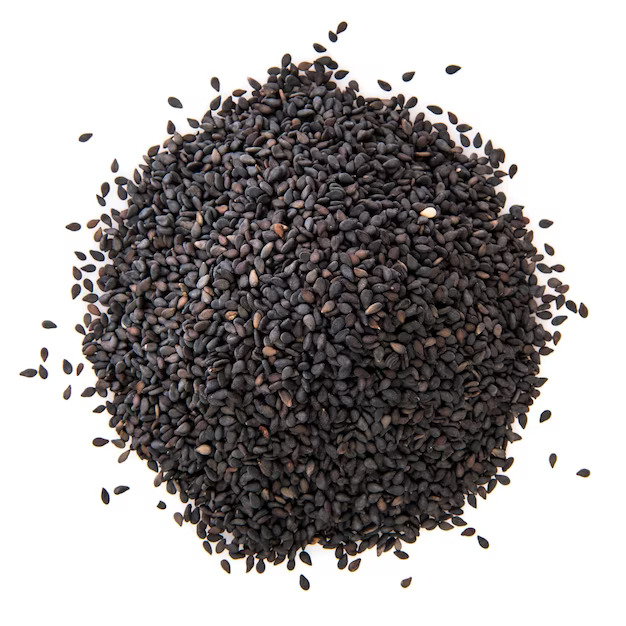Black sesame seeds may be tiny, but they provide big health benefits. With a nutty flavor and impressive nutrient profile, black sesame seeds deserve a spot in your diet. This in-depth guide covers everything you need to know, from nutrition facts to scientific benefits, ways to eat them, and how black sesame seeds can enhance your health.
- What are Black Sesame Seeds?
- Black Sesame Seeds Nutrition Facts
- Health Benefits of Black Sesame Seeds
- How to Eat Black Sesame Seeds
- Black sesame seeds bread?
- Black sesame nutrition ?
- Black sesame seeds benefits for hair
- Black sesame seeds benefits for females
- Black sesame seeds benefits for males
- Black sesame seeds vs Kalonji seeds
- Storing Black Sesame Seeds
- The Nutritious Power of Black Sesame Seeds
- Frequently Asked Questions
What are Black Sesame Seeds?
Black sesame seeds come from the sesame plant (Sesamum indicum), an ancient oilseed crop that has been cultivated for over 5000 years. They grow in long pods that burst open when ripe, revealing the coveted sesame seeds inside.
While most sesame seeds are tan or cream-coloured, black sesame seeds get their dramatic dark hue from high levels of phytonutrients, including anthocyanins.
Black sesame seeds are smaller compared to white sesame seeds. They have a bolder, nuttier taste that adds interesting texture and flavor to dishes.
Just a teaspoon of these mighty black seeds packs a powerhouse dose of nutrients like protein, fibre, antioxidants, vitamins, and minerals.
Black Sesame Seeds Nutrition Facts
A 100 gram serving (about 3.5 ounces) of dried black sesame seeds contains:
- Calories: 573
- Protein: 18g
- Fat: 50g
- Carbs: 20g
- Fiber: 12g
Black sesame seeds are an excellent source of plant-based protein and heart-healthy fats. They provide high amounts of fiber compared to other seeds and nuts.
Vitamins and Minerals
Black sesame seeds are dense in many essential vitamins and minerals:
- Calcium: 975 mg – Needed for bone health and nerve function
- Iron: 14.55 mg – Essential for oxygen circulation and metabolism
- Magnesium: 351 mg – For muscle and nerve function
- Phosphorus: 829 mg – Key for energy production
- Zinc: 7.75 mg – For immune function and cell growth
- Copper: 4.082 mg – Required for iron absorption and brain health
- Potassium: 468 mg – For fluid balance, heart health and muscle function
- Folate: 97 μg – Important for cell division and DNA formation
- Thiamine: 1.874 mg – Vitamin B1 critical for energy metabolism
Antioxidants
Black sesame seeds are rich in antioxidant compounds called lignans, including sesamol, sesamolin, and sesamol.
These polyphenols combat free radicals that can damage cells and lead to aging, inflammation, and disease in the body.
Sesame seeds also contain anthocyanins – antioxidants that give the black seeds their dark colour. Anthocyanins have anti-inflammatory and anticancer effects in studies.

Health Benefits of Black Sesame Seeds
With their stellar nutritional profile, black sesame seeds offer many science-backed health benefits:
Rich Source of Plant-Based Protein : Black sesame seeds provide substantial amounts of high-quality protein with all the essential amino acids. Just 100 grams provides over 30% of your daily protein requirements. It makes them an excellent protein source for vegetarians/vegans as well as athletes. The amino acids aid muscle building and recovery.
May Improve Heart Health :Sesame seeds contain healthy fats like oleic acid along with antioxidants that benefit heart health in multiple ways:
- Lower blood pressure: Sesamin in sesame helps reduce hypertension
- Improve blood lipids: Sesame lignans reduce LDL and total cholesterol
- Reduce inflammation: Sesame anthocyanins minimize inflammation in blood vessels
- Prevent plaque buildup: Fibers bind to cholesterol and remove it from the body
Combats Diabetes : Studies show black sesame seeds can lower blood sugar, improve insulin resistance, and prevent complications in diabetic patients. The fiber slows digestion, while antioxidants minimize oxidative stress caused by high blood sugar levels. It helps manage diabetes.
May Have Anticancer Effects : Research indicates the antioxidants sesamol, sesamolin, and anthocyanins in sesame seeds demonstrate anticancer activity thanks to their free radical scavenging properties. They are shown to induce apoptosis and restrict proliferation in cancer cells. More human studies are still needed in this area.
Boosts Digestion : The high fibre content in black sesame seeds helps promote good digestion and gut health. Fibre prevents constipation by adding bulk to stool and enhancing regular bowel movements.
Supports Bone Health :Calcium, phosphorus, zinc, and other minerals in black sesame seeds help maintain bone mineral density and reduce the risk of osteoporosis. The antioxidants also promote bone health.
Benefits: Hair, Skin and Teeth : Zinc in black sesame is great for hair growth and repair. The seeds help strengthen roots and minimize hair shedding. Calcium also contributes to healthy teeth and gums. When applied topically, sesame oil moisturizes the skin.
How to Eat Black Sesame Seeds
Toasted black sesame seeds add delicious crunch, visual appeal, and nutty aroma to both sweet and savory recipes. Here are some tasty ways to enjoy them:
- Smoothies – Blend into shakes, lassis, yogurt drinks
- Salads – Sprinkle onto leafy, grain and pasta salads
- Noodles – Garnish Asian noodles and stir-fries
- Rice – Mix into fried rice, congee, biryani
- Proteins – Coat fish, chicken, tofu before baking/frying
- Vegetables – Toss with roasted vegetables like carrots, broccoli
- Soups – Add to miso, lentil, noodle and curry soups
- Sauces – Include in hummus, tahini, nut butter sauces
- Baked goods – Top breads, bagels, muffins, cookies
- Bars – Incorporate into granola and energy bars
- Yogurt – Mix into yogurt, chia puddings, oatmeal
- Trail mixes – Combine with nuts, seeds, and dried fruit
- Tea – Sprinkle on bubble and milk tea drinks
Sesame oil made from pressed black sesame seeds can also be used for cooking, marinades, dressings, etc.
To release the most flavor and nutrition, it’s best to toast black sesame seeds before eating. Toast in a dry skillet over medium heat for 1-2 minutes until fragrant and lightly golden.
Black sesame seeds bread?
Black sesame bread is made using black sesame seeds in the dough. The seeds provide a rich, nutty flavor and crunchy texture. Because black sesame seeds are high in protein, fiber, healthy fats, vitamins B1, E and iron, this bread packs a big nutritional punch. The fiber aids digestion while the iron improves blood health.
Black sesame nutrition ?
Black sesame seeds are nutritional powerhouses, being excellent sources of copper, calcium, magnesium, iron, phosphorus, manganese and zinc. Just a tablespoon provides almost 4 grams of beneficial fats, over 2 grams of fiber and 2 grams of complete protein. They also provide lignans with potent antioxidant and anti-inflammatory effects that can lower cholesterol and blood pressure.
Black sesame seeds benefits for hair
The iron in black sesame seeds enhances blood circulation in the scalp which stimulates hair growth. Their vitamin E moisturizes the scalp preventing dandruff and their antibacterial properties limit infections. Their linoleic acid strengthens hair follicles making hair less prone to breakage and fall. Massaging them into hair and rinsing out increases shine.
Black sesame seeds benefits for females
The high copper content of black sesame seeds helps prevent osteoporosis while their lignans balance hormones helping with PMS and fertility. The iron and protein compensates for blood and nutrient loss during periods. During pregnancy, the calcium, folate and magnesium support proper fetal development and during lactation, it boosts milk production.
Black sesame seeds benefits for males
Black sesame seeds may help boost declining testosterone levels in males. This helps increase stamina and muscle development. Their fatty acids aid blood circulation which alleviates erectile dysfunction. The antioxidants keep sperm healthy and zinc content increases sperm production. The iron improves musculoskeletal health.
Black sesame seeds vs Kalonji seeds
While black in color, black cumin/Kalonji seeds are smaller, have a more triangular shape and are bitter, not sweet. Kalonji seeds contain thymoquinone, an anti-inflammatory and anti-cancer compound not present in black sesame seeds. So while their color is similar, they are nutritionally different.
Storing Black Sesame Seeds
To extend freshness, store black sesame seeds in an airtight container in a cool, dry place away from heat or sunlight. Ground sesame seeds have a shorter shelf life.
Whole sesame seeds kept properly will stay fresh for up to 3 months. Refrigerating or freezing extends their life even longer.
Check for freshness before eating. Sesame seeds should have an oil-rich, nutty aroma when sniffed. Discard any seeds that smell rancid or musty.
The Nutritious Power of Black Sesame Seeds
Black sesame seeds definitely deserve a regular place in diets, given all their incredible benefits backed by science. They pack a nutritional punch with protein, healthy fats, fiber and antioxidants.
Studies show they help lower blood pressure, improve heart health, manage diabetes, enhance digestion, strengthen bones and more.
With a delicious nutty crunch and sweet aroma, black sesame seeds can easily be added to both sweet and savory recipes. Keep a bag on hand to sprinkle anytime your meals and snacks need a nourishing lift.
Frequently Asked Questions
- Are black sesame seeds healthier than regular ones?
Yes, black sesame seeds are nutritionally superior to plain sesame seeds. They contain higher amounts of antioxidants, including anthocyanins, that provide anti-inflammatory and anticancer activity. The darker pigment indicates more flavonoids.
- Do you have to soak black sesame seeds before eating?
It is not required to soak black sesame seeds. However, drinking makes them easier to blend into smoothies or purees. Soak for 2-4 hours, drain, and then mix.
- Can you eat black sesame seeds raw?
Yes, black sesame seeds are perfectly safe and nutritious to eat raw. Toasting brings out more flavour. But the nutrients are still intact when eating them raw.
- Are black sesame seeds gluten-free?
Yes, black sesame seeds are naturally gluten-free. They are a good ingredient choice for gluten-free recipes and diets. Always check the packaging to confirm gluten-free status.
- Where can I buy black sesame seeds?
You can find black sesame seeds in most grocery stores, health food markets, Asian specialty stores, and online retailers like Amazon. Look for reputable brands that confirm non-GMO, gluten-free status.
Enjoy all the tasty and healthy ways to eat nutrient-dense black sesame seeds!
Featured Articles:
https://getfitnessguru.com/health-secrets-of-makhana-9-benefits/









